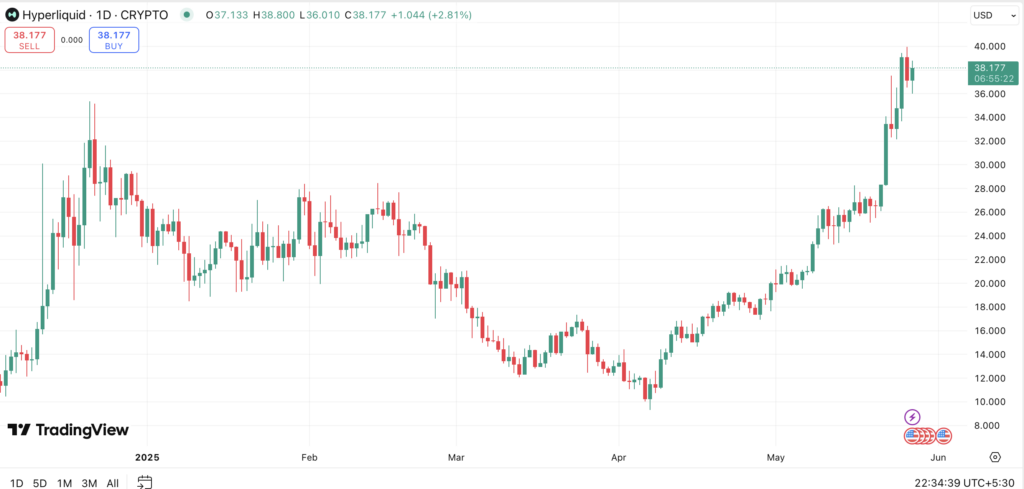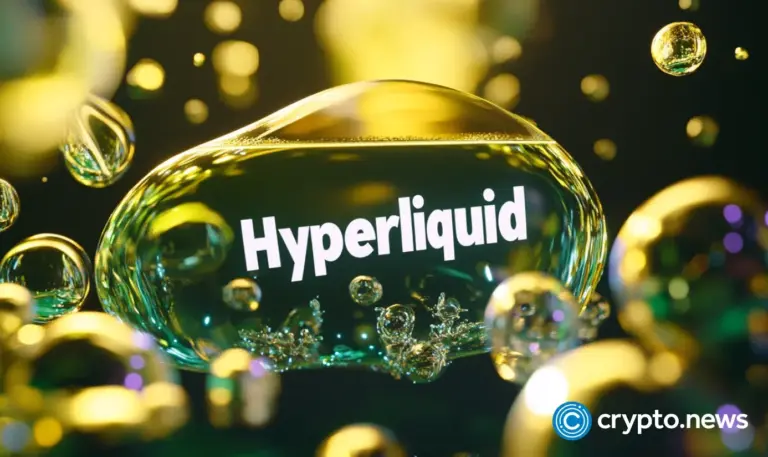As altcoins stagnate, Hyperliquid crypto surges 300%, are $1B trades and a VC-free model driving the Hyperliquid price prediction narrative?
Hyperliquid crypto enters price discovery as HYPE outpaces major altcoins
In a market where major altcoins have largely traded sideways through most of May, Hyperliquid (HYPE) has quietly built its own bullish momentum.
HYPE reached an all-time high of $39.93 on May 26, rising more than 326% from its Apr. 7 low of $9.36. The climb unfolded gradually, with the price crossing $28 by May 21 and pushing past $30 during the final stretch of the month.
As of May 27, HYPE is trading around $38.5. While that reflects a 4.5% dip from the recent peak, it still marks a 47% gain over the past seven days.

Trading activity has remained strong, with 24-hour volume hovering around $345 million. Hyperliquid’s market cap now stands at approximately $12.5 billion, placing it as the 11th largest crypto asset by market value.
Fueling this rally is a noticeable improvement in key on-chain metrics. Open interest hit a record high of $10.1 billion, and daily trading fees reached $5.6 million on May 26, highlighting increased usage and engagement.
The recent integration of USD Coin (USDC) as the main settlement asset has also added more depth to the ecosystem. With $3.5 billion now locked on the platform, confidence appears to be growing among both institutional participants and retail users.
Let’s look at what Hyperliquid does, why it’s gaining traction among users, and what current price predictions suggest about its potential path forward.
What drives the Hyperliquid price?
Hyperliquid, launched in November 2024, runs on a custom layer 1 blockchain architecture designed to support fully on-chain trading of perpetual futures.
Unlike many decentralized exchanges that rely on off-chain order matching and on-chain settlement, Hyperliquid processes all transactions, orders, and trades directly on-chain. The system is anchored by two main components: HyperBFT and HyperEVM.
HyperBFT, a consensus protocol influenced by Meta’s LibraBFT, is built to handle throughput of up to 2 million transactions per second. It finalizes blocks in under a second and can process as many as 100,000 orders per second.
HyperEVM ensures compatibility with the Ethereum Virtual Machine, giving developers the ability to deploy Ethereum-based smart contracts while benefiting from faster execution and lower transaction fees.
The platform offers perpetual futures trading across several major crypto assets, including Bitcoin (BTC), Ethereum (ETH), Avalanche (AVAX), Solana (SOL), and Sui (SUI). Traders can use up to 50x leverage and are not required to hold the underlying asset to open a position.
New users onboard through wallet-based login, and the exchange does not conduct know-your-customer checks. This model stands in contrast to most centralized platforms and may raise regulatory questions in certain jurisdictions.
In addition to derivatives, Hyperliquid enables spot trading through its HIP-1 token standard, which is structurally similar to Ethereum’s ERC-20. Token listings come with relatively high costs, a measure aimed at reducing spam and filtering out low-quality projects.
The protocol also includes a Vaults feature that allows users to allocate capital to traders or algorithmic strategies in a non-custodial way. All vault performance data is public, and fund movements occur entirely on-chain.
Hyperliquid has stated that it has not taken any venture capital funding. Positioning the absence of VC involvement as a strategic choice, the team says it is focused on building long-term infrastructure rather than chasing short-term token performance.
James Wynn’s $1.25B position boosts trust in Hyperliquid wallet
Hyperliquid’s growing presence in the DeFi space is backed by a series of tangible developments that have unfolded over the past few months.
On May 23, Hyperliquid Labs submitted two public comment letters to the U.S. Commodity Futures Trading Commission in response to the agency’s request for feedback on the future of perpetual futures and 24/7 crypto markets.
The letters called for regulatory approaches that support decentralized infrastructure while maintaining financial safeguards, marking the first time Hyperliquid participated in policy discussions at this level.
The market reacted swiftly. HYPE rose 15% that day, according to CoinMarketCap data, signaling investor confidence in the platform’s long-term regulatory position.
Infrastructure has also remained central to Hyperliquid’s momentum. The February rollout of HyperEVM introduced Ethereum compatibility, enabling smart contracts from the Ethereum ecosystem to run natively on Hyperliquid.
This upgrade paved the way for new integrations, including support for Tether (USDT), expanding the platform’s stablecoin functionality. As a result, the ecosystem now allows for more flexible trading strategies, smoother interoperability, and easier capital movement across networks.
High-volume traders have taken notice. Earlier last week, derivatives trader James Wynn opened a $1.25 billion Bitcoin long position on Hyperliquid, one of the largest on-chain derivatives trades recorded to date, showing that the network can handle institutional-scale activity without performance issues.
Retail interest has picked up as well. Throughout May, social media posts have speculated about a second token airdrop. With 38% of the HYPE supply still unallocated, users have begun tracking on-chain signals for eligibility.
The speculation builds on the original airdrop from November 2024, which distributed HYPE to early users. Rising wallet activity and cross-chain transactions this month suggest renewed engagement from both first-time participants and returning users.
Hyperliquid price prediction: Hyperliquid token may face resistance
Hyperliquid’s strong momentum in May has pushed the token into price discovery territory. On the HYPE/BTC weekly chart, the asset is now trading at all-time highs relative to Bitcoin — a rare position for any altcoin during a period when many others are still struggling to break through resistance.
Pushing higher from this point presents more complexity. One perspective, shared by Defi Monk, a researcher at Messari, suggests that Hyperliquid may be approaching saturation in terms of retail trading activity.
According to him, the platform’s growth from zero to capturing 20% of Binance’s volume share happened during a unique window in the market. Expanding further into high-frequency and institutional territory, however, may prove slower.
“Getting from 20% of Binance’s volume share to 50% will be a much harder path,” he explains, pointing to latency requirements and the challenges of attracting professional trading flow. At the same time, he notes that Hyperliquid’s current position is difficult to displace.
Early on, competition was limited. Now, any new entrant must compete directly with Hyperliquid’s infrastructure, depth of liquidity, and established user base.
As he puts it, “Now the bar is Hyperliquid itself.” Going forward, the protocol’s trajectory may depend less on rapid growth and more on how effectively it defends its position against emerging platforms like GTE_XYZ and others.
In terms of price action, near-term technical models offer a more cautious view. Forecasts from Coincodex suggest HYPE could decline more than 22% over the next 30 days, targeting a price of $28.50 by June 26.
Despite the projected correction, broader sentiment remains positive. The Fear & Greed Index is holding at 74, indicating elevated market appetite, while the sentiment indicator stays in bullish territory.
On a longer time frame, projections from Coincodex outline a wider range of outcomes. For 2025, the model places HYPE’s maximum price at $36.86, which sits near current levels and implies limited upside in the short term.
For 2026, the model projects a potential high of $94.85, which would represent a gain of over 150%. Estimates continue to climb through 2029, with the upper bound reaching $145.28.
Price forecasts, regardless of how data-driven they appear, always involve a degree of uncertainty. The DeFi space moves quickly, and changes in regulation, platform security, or user behavior can shift token performance without warning.
Traders considering exposure to HYPE should treat it like any other high-volatility digital asset. As always, trade wisely and never invest more than you can afford to lose.
Disclosure: This article does not represent investment advice. The content and materials featured on this page are for educational purposes only.


